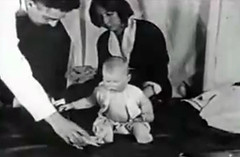| 5528668395 | Learning | Relatively permanent change in an organisms behavior due to experience |  | 0 |
| 5528668396 | Associative Learning | Defined: learning by putting together two events Example: Expect to hear thunder after viewing lightening |  | 1 |
| 5528668398 | Pavlov, Ivan | Contribution: developed the theory of "classical conditioning" while working with dogs Significance: Father of Classical Conditioning |  | 2 |
| 5528668399 | Watson, John B | Contribution: applies Classical Conditioning to Humans through the "Little Albert" Experiment Significance: Creates "Behaviorism" Theory, shows emotional responses can be conditioned, demonstrates generalization. |  | 3 |
| 5528668401 | Skinner, B.F. | Contributions: Invented the Operant chamber, aka his box, to use in his research of animal learning. Significance: Father & Developer of Operant Conditioning |  | 4 |
| 5528668402 | Bandura, Albert | Contribution: Studied how children mimic others behaviors and repeat that same behavior Significance: Creates "Observational Learning" Theory, Bobo Doll experiment |  | 5 |
| 5528668403 | Thorndike, Edward | Contribution: studied cats in puzzle boxes and recorded their behaviors Significance: Creates "Law of Effect" theory |  | 6 |
| 5528668404 | Garcia, John | Contribution: Demonstrated the significance of biological processes in classical conditioning Significance: Creates "Taste Aversions" theory |  | 7 |
| 5528668405 | Seligman, Martin | Contribution: Used dogs to demonstrates the significance of cognitive processes in classical conditioning Significance: Creates "Learned Helplessness" theory |  | 8 |
| 5528668406 | Tolman, Edward | Contribution: demonstrated the significance of cognitive processes in operant conditioning by studying rats in mazes Significance: Creates the "Latent Learning" theory |  | 9 |
| 5528668407 | Pavlov's Dogs | First experiment that created and demonstrate the theory of classical conditioning |  | 10 |
| 5528668408 | Little Albert | First experiment to demonstrate how emotions can be classically conditioned in humans Provides a foundation for the "Behaviorism Theory" |  | 11 |
| 5528668409 | Classical Conditioning | Learning that takes place when two or more stimuli are paired together to produce unavoidable physical reactions. UCS = UCR; NS + UCS = UCR; & CS = CR |  | 12 |
| 5528668410 | Behaviorism | Psychologist: John B. Watson Defined: a theory that made psychology an objective science by making it based on observable (and only observable) events, not the unconscious or conscious mind. |  | 13 |
| 5528668411 | Unconditioned Stimulus | Part of Classical Conditioning It is the stimulus that triggers a natural reflexive response. Pavlov's Dogs: "Meat" Little Albert: "Loud noise" |  | 14 |
| 5528668412 | Unconditioned Response | Part of Classical Conditioning It is the unlearned, naturally occurring response to the stimulus Pavlov's Dogs: It was the "Salivating to the Meat" Little Albert: "Screaming at the Loud Noise" |  | 15 |
| 5528668413 | Conditioned Stimulus | Part of Classical Conditioning It initially has no effect but after conditioning, it triggers a natural reflexive response. Pavlov's Dogs: It was the "Bell" Little Albert: "White Mouse" |  | 16 |
| 5528668414 | Conditioned Response | Part of Classical Conditioning Occurs after conditioning when the conditioned stimulus (CS) triggers an innate response Pavlov's Dogs: It was the "Salivating to the Bell" Little Albert: "Screaming/Crying" because of the white rat |  | 17 |
| 5528668415 | Neutral Stimulus | does not caused an unconditioned response but eventually becomes the Conditioned Stimulus |  | 18 |
| 5528668417 | Extinction | Classical Conditioning: The disappearance of a behavior because CS no longer paired with the UCS. (I go for years never being bit again by a chihuahua and I find I no longer panic when I am near one) Operant Conditioning: The disappearance of a behavior because it is no longer reinforced or punished |  | 19 |
| 5528668418 | Spontaneous Recovery | Classical Conditioning: When a previous conditioned response returns after it has been extinguished. (After years of being ok near dogs, suddenly you begin to panic once more.) Operant Conditioning: Occurs when a response begins again after extinction. | 20 | |
| 5528668419 | Stimulus Generalization | Classical Conditioning: When the conditioned response spreads and is prompted by stimuli similar to the conditioned stimulus. (Example: Little Albert being afraid of anything that is white and furry) Operant Conditioning: When a reinforced/punished behavior occurs in a setting/situation where it was NOT learned (Example: Operantly Conditioned to not curse at home so you also don't curse at school) |  | 21 |
| 5528668420 | Stimulus Discrimination | Classical Conditioning: the conditioned response is only prompted by the conditioned stimulus. (Example: I am only afraid of chihuahuas because I was bit by one. I am not afraid of labs or retrievers or Morkies.) Operant Conditioning: When a reinforced/punished behavior occurs in a setting/situation where it was learned (Example: Cursing only at home because it is acceptable there but not at school where it isn't acceptable) |  | 22 |
| 5528668422 | Taste Aversions | Psychologist: Garcia Defined: If you ingest an unusual food or drink and then become nauseous, you will probably develop an aversion to the food or drink. (Me and Hibachi) Significance: Violates the acquisition principles of classical conditioning because it only takes one pairing. |  | 23 |
| 5528668423 | Learned Helplessness | Defined: Exposure to inescapable and uncontrollable aversive (bad) events produces passive behavior Study: Seligman delivering shocks to dogs Example: If a student consistently fails math, they may start to give up or a sports team that consistently loses may start to believe they can't win |  | 24 |
| 5528668425 | Biological Preparedness | Defined: humans and animals have predisposed fears that help us survive Examples; Phobia of heights keeps us away from danger |  | 25 |
| 5528668426 | Operant conditioning | Defined: Learning is based on the association of one's behavior and its consequences. Consequences are reinforced or punished Example: You choose to break curfew based on the consequences |  | 26 |
| 5528668427 | Law of Effect | Psychologist: Edward Thorndike Defined: if a behavior results in a satisfying consequence, it will likely be repeated whereas; if a behavior results in a unsatisfying consequence, it will NOT likely be repeated Example: If you complement your mother and she lets you stay out past curfew, you will complement her again |  | 27 |
| 5528668428 | Skinner Box | Description: A chamber containing a bar or key that an animal (rat or pigeon) can manipulate in order to obtain a reward |  | 28 |
| 5528668429 | Positive Reinforcement | Part of Operant Conditioning Adding something to increase the likelihood of a behavior occurring again Example: Receiving $5 for every "A" in high school |  | 29 |
| 5528668430 | Negative Reinforcement | Part of Operant Conditioning Increasing the likelihood of a behavior occurring again by removing a negative stimuli Example: Taking aspirin to relieve a headache |  | 30 |
| 5528668431 | Primary Reinforcers | Reinforcers that are rewarding such as food, water, rest, whose natural properties are reinforcing. |  | 31 |
| 5528668432 | Secondary Reinforcers | Defined: Reinforcers that are rewarding because we learned that they are reinforcing. Example: praise, money, the chance to play video games. |  | 32 |
| 5528668435 | Punishment by Application/Positive Punishment | Part of Operant Conditioning Adding something to decrease the likelihood of a behavior occurring again Example: Spanking and yelling |  | 33 |
| 5528668436 | Punishment by Removal/Negative Punishment | Part of Operant Conditioning Removing something to decrease the likelihood of a behavior occurring again Example: No phone for a week |  | 34 |
| 5528668438 | Shaping | Part of Operant Conditioning Positively reinforcing closer and closer approximations of a desired behavior to teach a new behavior |  | 35 |
| 5528668440 | Superstitious Behavior | Defined: if a random reinforcement follows an event, the event will likely be repeated. Example: a lucky shirt, shoes, etc. |  | 36 |
| 5528668441 | Continuous Reinforcement Schedule | Defined: When every behavior is reinforced Example: every single time a child pees on the toilet, they get an M&M` Significance: quickly learned, but quickly lost. |  | 37 |
| 5528668442 | Partial Reinforcement Schedule | Defined: When a random behavior is reinforced Example: Fixed Ratio, Variable Ratio, Fixed Interval, Variable Interval Significance: best for "maintaining" a behavior |  | 38 |
| 5528668443 | Fixed-Ratio Schedule | Defined: reinforcement occurs after a set number of responses. Example: Being paid for every 10 pizzas made |  | 39 |
| 5528668444 | Variable-Ratio Schedule | Defined: schedule of reinforcement after a varying number of responses. Example: playing a slot machine- how many pulls before I hit it rich varies |  | 40 |
| 5528668445 | Fixed-Interval Schedule | Defined: schedule of reinforcement after a fixed amount of time has passed Example: being paid every two weeks |  | 41 |
| 5528668446 | Variable-Interval Schedule | Defined: schedule of reinforcement after varying amounts of time Example: pop (surprise) quizzes in class |  | 42 |
| 5528668447 | Latent Learning | Defined: Learning that occurs but is not apparent until there is an incentive to demonstrate it Example: Tolman's rats had learned the maze by wandering around, but only demonstrated it when he gave them cheese. |  | 43 |
| 5528668448 | Cognitive Maps | Defined: having the ability or know how to accomplish a particular task Example: Tolman's rats knew how to complete the maze |  | 44 |
| 5528668450 | Insight Learning | Defined: suddenly knowing the solution to the problem Example: When taking a test and the previous answer comes to you without effort, an "aha" moment |  | 45 |
| 5528668453 | Observational Learning | Defined: learn by watching others Example: BoBo Doll Study |  | 46 |
| 5528668454 | BoBo Doll Study | Psychologist: Bandura Description: Children watched (through a one way glass)a confederate play with the BoBo doll and then played with the BoBo doll in the same way as the confederate Significance: used to develop "observational learning" |  | 47 |
| 5528668455 | Mirror Neurons | Defined: frontal lobe neurons that fire when performing certain actions or when observing another doing so Example: explains why yawning is contagious |  | 48 |
AP Psychology Learning Flashcards
Primary tabs
Need Help?
We hope your visit has been a productive one. If you're having any problems, or would like to give some feedback, we'd love to hear from you.
For general help, questions, and suggestions, try our dedicated support forums.
If you need to contact the Course-Notes.Org web experience team, please use our contact form.
Need Notes?
While we strive to provide the most comprehensive notes for as many high school textbooks as possible, there are certainly going to be some that we miss. Drop us a note and let us know which textbooks you need. Be sure to include which edition of the textbook you are using! If we see enough demand, we'll do whatever we can to get those notes up on the site for you!

